The Truth About Fake Meat & Protein Bars (or: Should You Eat Soy Protein?)
This post may contain affiliate links. As an Amazon Associate, I earn from qualifying purchases. Please read my disclosure.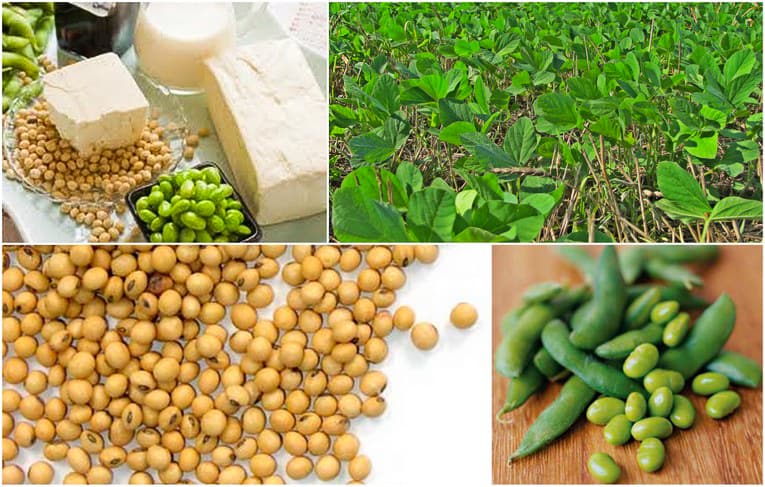
A few weeks ago, I was chatting with the husband about protein bars.
Since he (and I) are vegetarian and since we are both super active, I’m always looking for healthy, veggie-friendly protein. Unfortunately, with all of the fake-meat-soy-products and soy-based protein bars out there – that’s often hard to come by.
This is because soy protein isolate has been used as a high protein source in many veggie-friendly products – which I tend to avoid eating (more on that later).
I was explaining all of this to the husband, and he pointed out that the information out there on soy in general is super confusing, as is knowing what types of nutrition bars or veggie-friendly protein products are healthy to eat.
And he’s right! I was confused about soy protein for the longest time (half the articles out there tout it as a superfood, and half of them vehemently disagree with eating soy), and it was only after I did lots of reading and research that I was able to come to a few conclusions of my own.
So here it is …
The Picky Eater’s Guide to Soy: What to Eat and What Not to Eat!
First, let’s look at unprocessed soy products like tofu, tempeh, miso, etc. as well as non-soy protein that people sometimes confuse as soy (seitan).
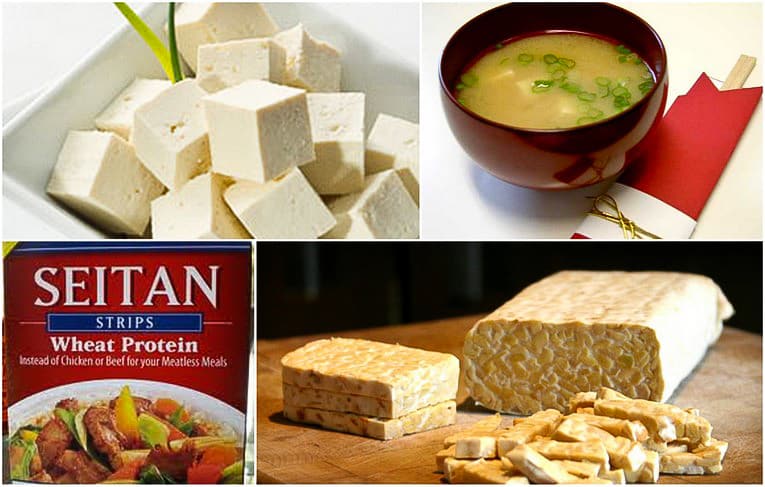
What are these products?
- Edamame are whole “young” soy beans – they are picked before the bean has hardened so you can eat them right from the pod.
- Tofu is made from whole soy beans. It is the bean curd that is mashed into blocks (after coagulating soy milk).
- Tempeh is made from fermented whole soy beans. The fermentation process binds the soy beans into a cake form.
- Miso is a thick paste made from fermented soybeans and barley or rice malt. It is used in Japanese cooking to make soups or sauces.
- Soy Milk is produced by soaking dry soy beans and grinding them up with water.
- Seitan isn’t soy at all! It’s actually a wheat protein made from wheat gluten.
Should you eat them? (you’ll see a theme here 🙂 )
- Edamame: Eat only if it’s 100% organic and non-GMO
- Tofu: Eat only if it’s 100% organic and non-GMO
- Tempeh: Eat only if it’s 100% organic and non-GMO
- Miso: Eat only if it’s 100% organic and non-GMO
- Soy Milk: Eat only if it’s 100% organic, non-GMO, and if the only two ingredients on the label are Whole Organic Soy Beans and Water
- Seitan: If it’s organic, 100% natural (no chemicals or other ingredients you can’t pronounce), and if you can tolerate gluten – it is fine to eat.
Why is it important to only eat organic soy?
Because over 90% of the soy in this country is genetically modified (GMO), unless it is organic. That means it’s more chemically altered, sprayed with toxic pesticides, and more processed compared to its organic relative.
The Bottom Line: Out of all of the unprocessed, whole soy products above – I’d recommend sticking to the fermented versions like tempeh and miso and enjoying the other soy products in moderation (more on why in the question below). And always choose 100% organic, non-GMO for any soy products you buy!
***
Now – onto the second question: What’s with the whole estrogenic-properties-of-soy thing?
Soy contains phytochemicals called isoflavones (aka phytoestrogens). Phytoestrogens are natural plant hormones that mimic estrogen in our bodies. For some people, these estrogens may help balance their hormones, but they can also throw off the hormonal balance for other people. The jury is still out on whether phytoestrogens are beneficial or “superfood-like.”
Eating soy is NOT the same as taking estrogen by any means. But some people are more sensitive to phytoestrogens than others — which is why I try to only eat whole soy products in moderation (not more than once or twice a week max). And I probably wouldn’t use soy-based forumla for babies because who knows how those phytoestrogens affect little ones.
BUT fermented sources of soy (like miso, tempeh, and natto) are actually better than non-fermented sources. Fermentation increases the digestibility of soy, adds good bacteria, and reduces the plant estrogen content in soy foods.
Side note: People with low thyroid functioning need to limit their soy consumption since soy contains substances called goitrogens which can slow the production and/or release of thyroid hormones in the body.
The Bottom Line: Eat soy in moderation and choose fermented when possible!
***
Lastly – the big question: What’s the deal with soy protein isolate and all of the veggie-friendly protein bars/products?
If you take a look at the nutrition label of most protein bars, veggie burgers, or fake-meat products, you’ll see soy protein isolate featured as one of the main ingredients.
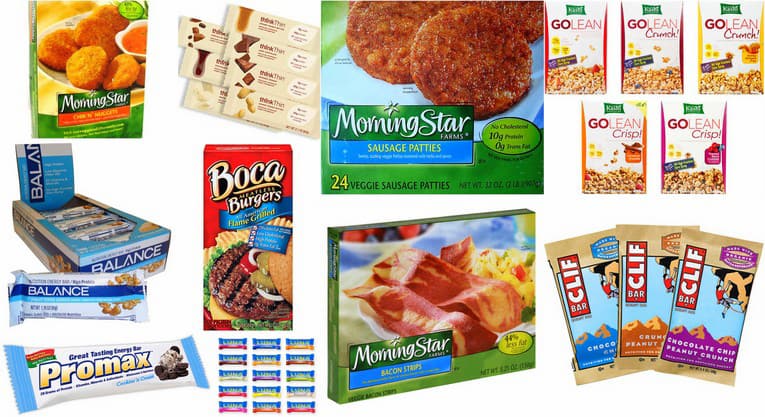
So what is soy protein isolate?
Soy protein isolate (SPI) is basically the isolated protein component from the soy bean. Creating SPI requires a heavily chemically engineered process to “isolate” that protein: the end result of which is a denatured protein that is stripped of all the nutrients (fiber, minerals, complex carbs) that the original bean contained.
Additionally, to isolate the soy protein, the soy beans are soaked and sprayed with chemicals like aluminum and hexane – which often leaves behind residue that you don’t want to be eating. Hexane is a neurotoxic petrochemical solvent that is listed as a hazardous air pollutant with the Environmental Protection Agency (EPA). The spray-drying method used for soy can also form nitrites – compounds that can form carcinogens in the body.
And if that’s not enough, SPI is always GMO and filled with pesticides.
Lastly, SPI has a higher concentration of trypsin inhibitors – which are chemicals that reduce trypsin (an enzyme that helps digest protein) in the body.
So SPI may have started out as a plant, but once it gets to you, it’s far from it. The products that use SPI also have the craziest list of ingredients and are super processed themselves (methylcellulose or disodium inosinate anyone?) – which is another reason to stay away from those products altogether. Remember if you can’t pronounce it, you probably don’t want to be eating it.
Some tips about SPI – it can be “hidden” under other names like:
- textured vegetable protein (TVP)
- soy protein concentrate
- Soya, Soja or Yuba,
- textured soy flour (TSF)
- textured soy protein (TSP)
The Bottom Line: NEVER eat products containing soy protein isolate or any “terms” related to soy protein isolate in the list above. Read your ingredient lists carefully and stay away from products with long ingredient lists you can’t pronounce!
This can be hard because lots of popular brands: Clif Bars, LUNA Bars, MorningStar, etc. have SPI on their ingredients list. But there are many other products out there that don’t! You just have to be a little more diligent and read the labels (health food stores and Whole Foods definitely have other options).
***
The Bottom Bottom Line: What to do if you’re vegetarian or want non-meat-protein sources?
#1 | Stick to natural, whole protein sources like beans, eggs, cottage cheese, Greek Yogurt, lentils, nuts, seeds and organic, non-GMO natural sources of soy like edamame, tempeh and tofu (free of sugar, artificial sweeteners, or other additives)
#2 | Try making veggie burgers at home or buy frozen veggie burgers that don’t have SPI like this kind from Amy’s
#3 | Stick to protein-bar brands that don’t use Soy Protein Isolate like Zing , LaraBar UBER, and CORE Foods. KIND is a good option as well, but read the labels carefully – some of their bars do have soy protein isolate in them! The KIND bars that don’t are a tasty and healthy snack.
#4 | If you like protein powder – try Amazing Meal or SunWarrior
That’s basically it!
In general shopping for healthy packaged food can be a challenge, but remember it’s all about reading the ingredients and knowing which ones to avoid. I hope this post helps you navigate the world of soy!
Check out these other helpful healthy eating guides!
- The 15 Healthiest Cereals for breakfast
- Healthiest Bread Brands
- 15 Pantry Meals You Can Make in 30 Minutes












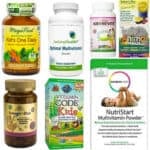
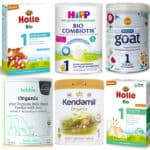



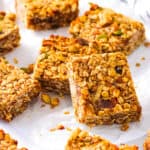












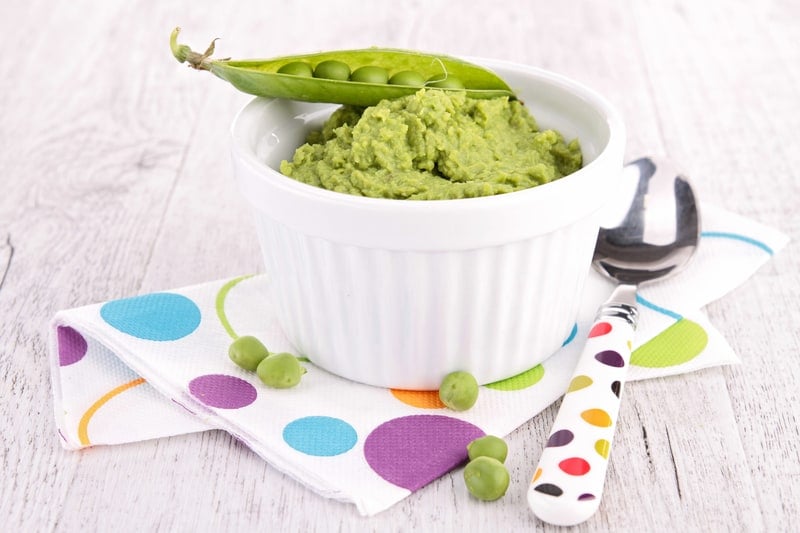



Thanks for the information. I have a question. How long after you have stop consuming the soy isolate that it’s no longer in you system?
Hi Evelyn! Good question. Soy protein isolate, like any other food, will leave your system as soon as it’s digested and released from the body (about 24 hours). Hope that helps!
Excellent information and very timely. I just recently arrived at the understanding of soy isolates you conveyed well here. Thanks for both confirming and anchoring it deeply in my mind. Salut – Greg PS I just recently purchased some Kind nut bars so interesting you should make mention of those too.
Thanks Greg! I’m so glad you found this post helpful!
Thanks, quite informative,I am vegetarian and concerned about the chemicals used in the processed soy products. I do not eatsoy fish cos it’s too close to the original ! Shall stick to natural veg protein sources!
Hi Praveen! Thanks I’m so glad you found this post helpful! Natural vegetarian protein sources like beans, dairy, etc. are the best!
This is a great article! All the things I struggle to verbalize when I explain to friends the food choices I make. It’s nice to know some more concrete reasons for avoiding “fake meat”- I’ve always just felt like I would rather eat food that isn’t pretending!
Thank you so much Muriah! I’m so glad this was helpful! And yes I’m with you — I much prefer whole (real) foods vs. fake meat which is just too processed for me!
Lots of great information in here. Thank you for thinking of and recommending Amazing Grass® as a good protein source for vegan, vegetarian and soy-free individuals! We’re also running a promotion now called Fresh Start: Two Week Challenge focusing on our Amazing Meal®s. Feel free to check out our program that offers daily videos, daily recipes, shopping lists and expert advice: https://amazinggrass.com/twoweekchallenge.html . You can see all the updates on our facebook page as well: https://www.facebook.com/greensuperfood .
I absolutely love your products! Thanks for sharing the additional info about your program and updates 🙂
Can you please tell me the name of tofu in india. Here no shops can identify what tofu is.
Hi Sourav! Hmm – I haven’t been to India in a long time (and haven’t looked for tofu in the market there) so I can’t be 100% sure. But here are some options to try: “bean curd” or “paneer made of soy/soya milk.” Hope that helps!
Hi Anjali, thanks a lot for this article, I’ve been doing some research on soya and this cleared up a lot of my doubts. I do have a question for you however. I am a regular gym rat and presently am on a cutting diet (high protein, low carbs). While I eat a lot of chicken breast and drink a lit of skimmed milk, I decided to try out soya as it’s cheap and the macros fit my diet plan.
The brand being sold where I live (NCR, India) is Nutrela High Protein Soya Mini Chunks. It has only 1 listed ingredient- 100% Soya (Defatted). And in the nutritional information chart is the shocker- 52gm protein for every 100gm. Is that even possible, given that 100gm chicken breast has less than half of that protein content? And more importantly, is it okay for me to work this into my diet, about 100-150 gm a day? (I need about 230gm protein a day, and struggling to hit that number).
Thanks in advance for your reply, it would really help me out. And a google search on this product will draw up whatever extra info you need. Thanks again.
Hi Siddharth! Thanks so much for reaching out and for your question! I’m going to try to answer it as best I can, given I’ve never seen this product before (I think it’s only sold in India and online), and I’ve never tried it either. I did do a Google Search for the product and the nutritional information I found was the same as you: 52g protein for 100g of the product. I think this is possible because 1 cup is 45g, and I think having about 21g protein for 1 whole cup of the Soy Chunks is reasonable. But what I couldn’t find any conclusive information about is how these soy chunks are made. E.g. are they made from 100% non-GMO soybeans and are similar to tofu? Or are they made with soy protein isolate, in which case I wouldn’t recommend them? That’s a question, unfortunately, that I don’t have an answer to. I’m not sure how food labeling works in India and what has to be disclosed vs. not. In general, I probably wouldn’t eat THAT much soy every single day regardless of whether it was organic/non-GMO/whole soybeans. I’d recommend incorporating other protein sources (like lean meat, beans, lentils, yogurt, etc.) since they are likely to be less processed than most packaged soy products. I hope that helps, sorry I couldn’t find more conclusive information about this product in particular! Let me know if you have any other questions in the meantime. Thanks again!
Thanks for the prompt reply. On the occasion of not eating ‘THAT much’, how much is too much? Just to give you some context, my other protein sources are lean chicken breast (300gm), oats (150gm), skimmed milk (1500gm), eggs (3). These numbers might seem a bit high to you but they are normal in gym circles. I am also 6’2” and weigh in at 220lbs, at 26 years of age.
Also, why would you not recommend that quantity? I have done my research- soy is a very debated topic in forums.bodybuilding.com. I am aware of the thyroid problems and the “phyto-estrogens limiting testosterone” theory- 2 accusations that have been endlessly debated over there for years but not settled till date. Wondering if any of those things have anything to do with your suggestion, or is it something else?
Hi Siddharth! Regarding the bodybuilding diet, to be honest I don’t really have expertise in this since it’s a pretty specific type of diet. I do understand that you need to eat more (food and protein) than the average person but I can’t really advise you on how much – I’d recommend talking to your doctor about this. About soy specifically, yes, the reasons I wouldn’t recommend eating that much are for all of the reasons I listed in the article — you don’t know which soy is GMO if it’s not labeled, soy protein isolate should absolutely be avoided, and the jury is still out on the estrogenic effects of soy. It seems that soy is fine in moderation, but that’s the key. In general, other than veggies & some fruits, I try to eat everything in moderation. As far as how much soy I’d eat weekly — I’d stick to only organic non-GMO tempeh and tofu (since they are whole food soy products) – about 1-2 servings (1 serving is 1/2 cup = 45g) once a week. I hope that helps!
Thank you so much for this! I’ve been a vegetarian since I was 11 (I’m now 21) and I’ve always been so confused about soy. I’ve tried to stick with natural sources just because it made intuitive sense but this really clears it up for me.
I like the idea of just buying organic non-gmo soy. What is your favorite non-soy vegetarian protein?
Again thanks a million- I’ll definitely be sharing this!!
No problem at all Georgie!! I’m so happy this post was helpful to you. And yes – I’m all about buying organic non-GMO whole soy products (and eating them in moderation). For non-soy veggie protein I rely a lot on lentils, beans, nuts, organic Greek yogurt and organic cottage cheese. Those are my favorites. If you’re looking for a non-soy protein “shake” — I like Amazing Meal and SunWarrior – they use rice, pea and hemp protein in their mixes which are all natural as well! Hope that helps!
A friend posted your article on Facebook and I was eager to read it as I’m a frequent consumer of Clif bars and Morningstar products. You definitely opened my eyes to the dangers lurking in “health” foods and I am very grateful to you for that. However, I’m writing this after finishing a KIND Bar (Penaut Butter Dark Chocolate + Protein) because guess what I just noticed listed among its ingredients – – soy protein isolate. You might want to remove KIND from your suggestion list. Be well!
Hi Jennifer! Thank you so much for your thoughtful message and for the heads up! I’m glad this post was helpful to you. And you are right – some KIND bars do have soy protein isolate in them (so disappointing!) But many of them don’t and are still good alternatives. I will definitely update this post to make that much clearer 🙂 Thanks again!
You opened my eyes, BUT where did you find information that “the soy beans are soaked and sprayed with chemicals like aluminum and hexane” ?
Hi Litia! There is actually research on how the soy protein is extracted from the soy bean – and that process includes spraying the beans with hexane. You can find one of the many research studies at https://www.cornucopia.org/ (you can also do a search on Google Scholar and you’ll find more info on the topic), and studies were republished on multiple health food news sites like well+good NYC and slate magazine. Additionally, if you look at Amy’s Veggie Burgers’ website – they talk about how they use hexane free soy protein / hexane free vegetable protein – and why that’s important. Hope that helps!
Ok, Interesting, thank you for reply 🙂
No problem! 🙂
FABULOUS post!!!!
Thank you so much Amanda!! 🙂
Great information for me and recently turned vegetarian girlfriend!
Yay!! So glad it was helpful to both of you! 🙂
Excellent blog about risks of soy isolates. As a health coach, I am often asked about the use of fake meats. I advise my clients to avoid processed foods, especially since most contain some soy derivative, usually GMO. Lots of people live on soy versions of burgers, chicken nuggets, and ribs. I am sharing your blog with my clients and including a link in my blog!
Thank you so much Beth!! I’m totally with you — so many people live on soy burgers/fake meat and it’s really important to know what goes into making those products! Thanks again for sharing my post and helping to spread the word 🙂
Wow super comprehensive look at this. Some great facts you’ve presented, and definitely quite a few things to consider. Thanks for your time in putting this together 🙂
No problem at all Larry!! I really just wanted to make this topic as easy to understand and comprehensive as possible. Thanks again for your kind words!
Hi Anjali! Such a great article! I’m definitely introducing it to my community today! Thank you for taking the time to put together such comprehensive information on such a complicated topic!
Yay!! Thanks for sharing this post with your community Teresa!! I’m so glad you found this helpful!
Much better if we it soybeans rather than to eat soy protein bars because we can’t assure, whether it is a fake or legit.. Well, good information Anjali. This is actually my first time to visit and read your blog post and I find it really useful
Thank you for the kind words Will!! I’m so happy you found this post (and my blog) useful. And yes, absolutely – whole organic soybeans are much much better to eat than soy protein bars/shakes/processed foods.